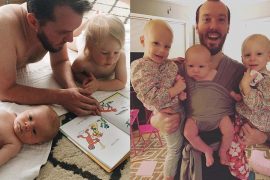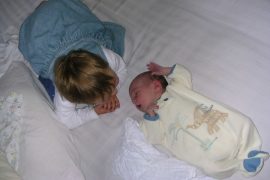The pot-holes on the road to individuation
Most of the things that go awry when our child is trying to tease out a separate self, stem from our unrecognized and unresolved hurts dating back to our own childhoods. Either we over-protect our children in our efforts to prevent them from feeling how we once felt, or we act-out against them in ways that mimic the hurtful ways we were once treated. What follows are some examples of how our unhealed wounds can lead us to overcompensate in ways that interrupt our children’s developing autonomy and strength.
The ‘as-if’ parent
When we over-extend, and try to be giving and attentive beyond our true capacity in any given moment, we risk bringing an ‘as-if’ quality to our giving. Contrived generosity looks and feels quite different to the spontaneous giving that springs from a full heart. Think of a time when someone close to you offered you kindness or support, but something about their demeanor – a forced smile, averted gaze – tipped you off to their ambivalence. How did this make you feel?
As parents, it is entirely possible for us to do all the ‘right’ things by-the-book: co-sleeping, full-term breastfeeding, baby-wearing, etc. But if we don’t ourselves feel loved and supported, or if we carry deep, unattended emotional wounds from our own childhood, our gestures risk being mechanical. Our giving can have a flavor of detachment, even resentment or exhaustion. Parents are better off striking a balance between being ‘real’ – that’s when their presence is truly nourishing – and fully achieving all the touchstones recommended in attachment-based or natural parenting handbooks. Remember, your presence is nourishing to the extent that it is congruent.
As soon as you begin to feel drained or irritable when you are caring for your baby or child, this is the time to ask others for emotional or practical support, or to let someone else who loves the child take over while you replenish yourself. Your emotional depletion might also signal the need for more loving attention to the parts of you that have been wounded. Notice how much more pleasurable, joyous and easy parenting can be when you are feeling nourished, loved, supported, healed.
The softly-softly approach
Many of us have been so hurt by the authoritarian methods of the last generation – the ‘do-as-you’re told’, punish-and-shame approach – that we have sworn we will never treat our own kids that way. It is very easy to overcompensate in the effort to avoid ‘sounding like our own parents’. When setting boundaries with our children, we try to use a sweet, sing-song tone, a sugary voice. The effects on our children range from confusing to grating, to infuriating.
Parents who don’t strongly assert their own needs and boundaries with their child, who don’t express ‘negative’ feelings and always speak softly disarm the child as a way to avoid conflict. Children have a keen sense of the authentic; they know if our efforts to sound gentle are incongruent with how we really feel inside. This frustrates and irritates them quite considerably, and can contribute to endless whingeing, whining, or tantruming.
Our children instinctively expect us to be ‘real’, and they rarely let us get away with inauthenticity.
Parents who are afraid to say ‘no’
The fear of saying ‘no’ is another example of overcompensation, driven by parents’ memories of having felt neglected or deprived as children. To keep saying ‘yes’ compulsively well into the toddler stage and beyond risks producing an over-indulged child, who struggles to find a real reason to respect others. Compulsive permissiveness can also prevent children from developing healthy ways of dealing with the daily realities of frustration, ultimately this is very disempowering.
The self-sacrificial parent
Some parents appear to almost never have their own needs for space, for quiet, or they appear to have little or no personal interests beyond servicing the needs of their kids. They cling to their children and become enmeshed in their lives, stuck in a martyr-like role. Often this is because they themselves felt emotionally or physically abandoned as children, and cannot bear to allow their children to forge an independent identity. Alternatively, this is a parent who was herself over-protected by possessive parents, and was not given the freedom to separate out, to explore the world beyond her family nucleus and develop her own perspectives. Her own parenting style may be affectionate and loving on the one hand, but overindulgent and smothering on the other.
Parents who are afraid to seem angry or annoyed
If we were victims of punishment, threats and shaming at school and at home, we associate anger with hurt and humiliation. When our parents, teachers or peers were angry with us, this was usually followed by some kind of punishment, humiliation or attack. As a consequence, we confuse anger with hostility, not realizing that the two are quite different. Few of us had good role models who showed us how to express anger responsibly; free of blaming and shaming. Not knowing how to express anger safely and without attack, we hold back our feelings. Yet it is entirely possible to be angry without being hostile, to command a child’s attention without threat or accusation. Usually, it is also possible to communicate strongly and assertively with our children without the need for anger in the first place.
How these dilemmas impact on the child’s behavior
When parents do not set boundaries, when they do not express their own needs and feelings, they seem ‘unreal’ to their children. This makes it difficult for children to find themselves, they remain enmeshed and dependent, and they don’t learn by example how to express their own needs respectfully.
The parent who neglects his or her own needs and feelings seems to lack definition or solidity, and to the growing toddler and child this can be extremely uncomfortable. Some children react by poking and prodding, they behave provocatively in search of some spontaneous reaction that feels authentic to them. Their behavior might seem irritating, whining, or directly vexing. This is not because they seek ‘negative’ attention. It is because they need their parents to seem ‘real’ to them, they need to experience a ‘real’ connection. They want to feel met.
Example: a toddler wants a toy, her mother says ‘no’ because it happens to be another child’s turn to play with this toy. The toddler screams at her mother and hits her. The mother responds with a gentle, soft voice: ‘please don’t hit Mummy, that’s not nice’. She is refusing to appear unpleasant, and overprotecting the child from conflict. This makes the child even angrier, because she feels as if her mother is not really with her. Because she is not reacting to the invasion, she does not seem solid or present. The child feels frustrated, the mother’s syrupy response feels like no response at all. She lunges at her mother and attacks her further. The more her mother tries to be placating and sugary, the angrier the child gets, till finally she melts into a full-blown tantrum.
Conclusion
Frequently when parents feel stuck, they ask ‘what do I do?’ – when so often it is not about ‘what to do’ but ‘how to be ‘. Many impasses in our relationships with our children seem to dissolve when we show our feelings to them in a way that connects with them. Many difficult or challenging behaviors are our children’s efforts to elicit that ‘real’ connection from us, they want to feel us through our responses.
There are no ‘good’ parents, this is a myth as fallacious as the idea of a ‘bad’ parent. That’s because when it comes to parenting, there is no finished product. As aware parents we are always becoming, it is our own journey of healing that makes us more available for relationship. And throughout life, it is this that heals all wounds: emotionally ‘real’ connection. The goal of parenting is ultimately not about ‘producing’ an outcome, such as a ‘happy’ child, a ‘confident’ child, a ‘successful’ child. It is about learning how to connect with our child at each step of the way. Connection is felt when we drop our armor, it comes from our emotional vulnerability, as well as our genuine interest in listening to and learning from our child, and giving him and her the respect and freedom to be themselves. Real connection is what heals, real connection is what causes us to grow, both parent and child.
Robin Grille is a psychologist, and author of Parenting for a Peaceful World (Longueville Media, 2005) and Heart to Heart Parenting (ABC Books, 2008). For more information, visit: www.our-emotional-health.com










